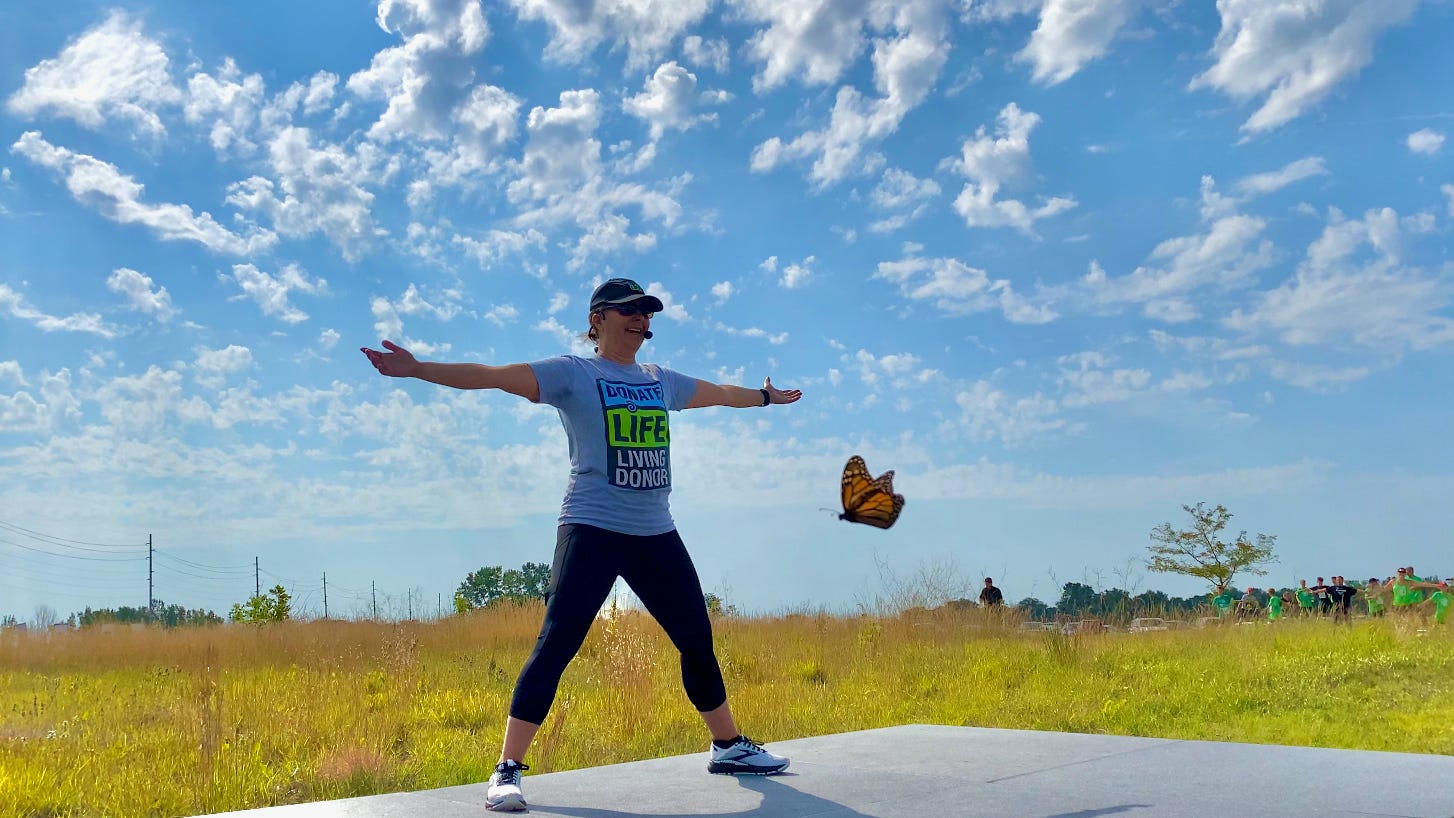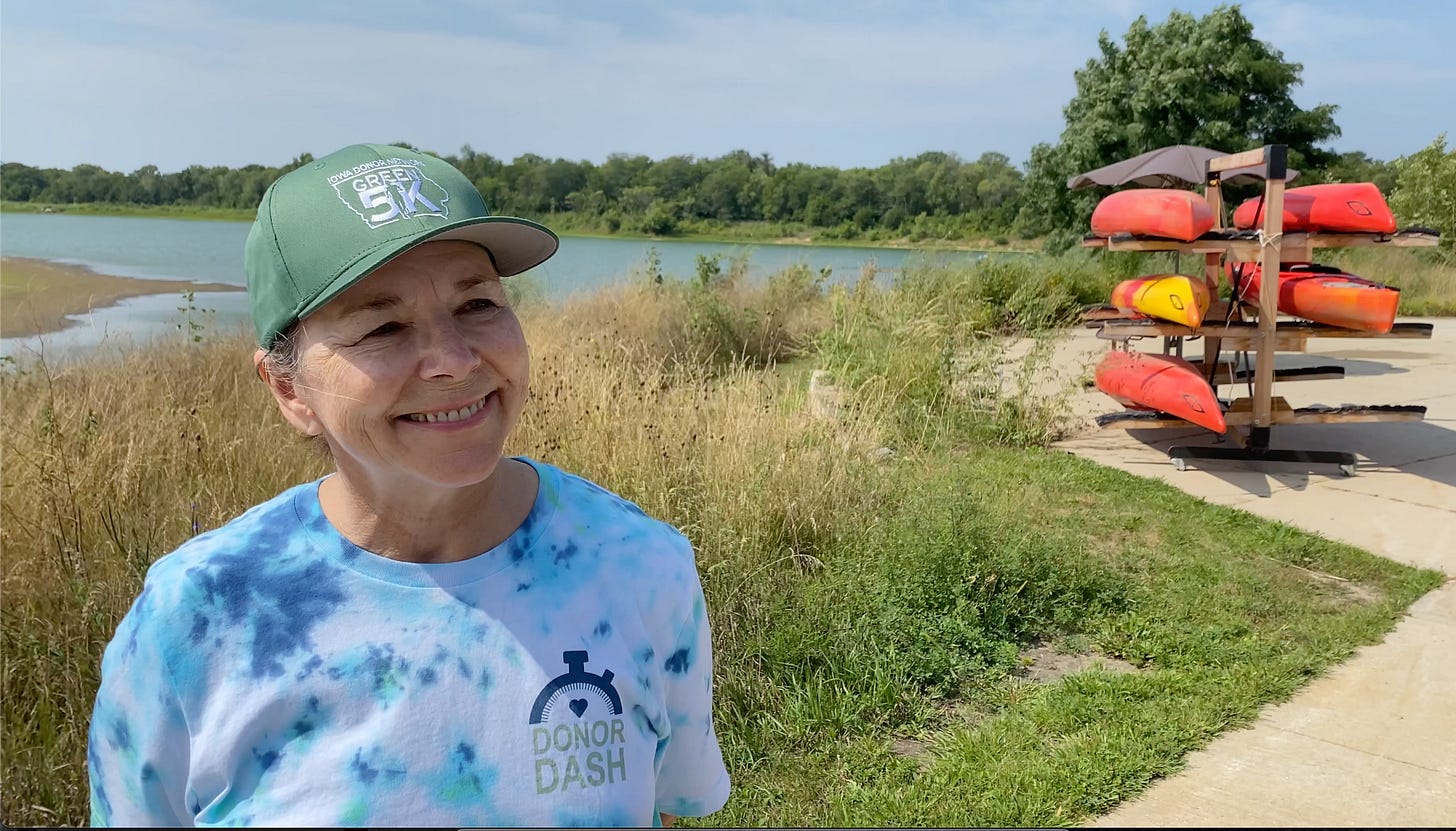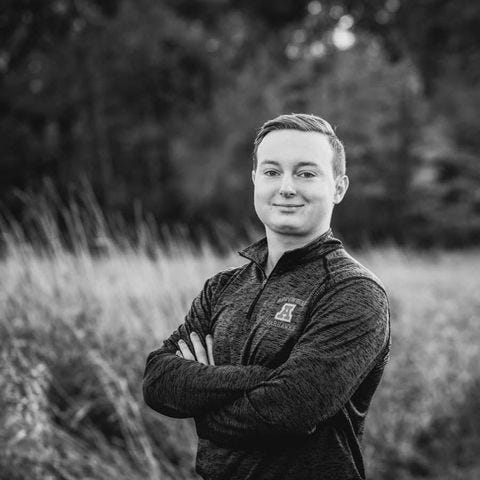Impact of organ donation forever lifts Iowans' lives
Nonprofit Iowa Donor Network celebrated organ donors, recipients and families with an Aug. 27 5K and fun run

IOWA CITY, Iowa——Nine months after a tragic accident claimed his life last November, Iowa State University freshman Drew DiDonato lives on through the people he enriched through organ and tissue donation and in loved ones' collective memories of the mindful man.
DiDonato, an autistic advocate for disabled and neurodivergent people, studied psychology at Iowa State. He planned to pursue an advanced degree in neuroscience.
"I am proud to be who I am. Many of my favorite qualities about myself are a direct result of my neurology. Normality is overrated. The aggregate knowledge and worth of a society is much greater with higher diversity," DiDonato wrote last year, marking Austic Pride Day on Instagram. "Never be afraid to be yourself. Eccentricity is often penalized, curiosity often systematically eradicated. Those who choose to ignore those societal norms and go where others haven't are the ones who truly enact change."
When DiDonato turned 18, he nervously asked his mother if he could get a tattoo—a rainbow streak through a triangular prism immortalized on the cover of Pink Floyd's Dark Side of the Moon, the English rock band's eighth album. She agreed.
"For my entire life, I have been lying to friends, family, acquaintances, and myself about who I really am. Over the past few months, I have really come to love and accept myself for all of my differences and embrace my true identity," DiDonato wrote in a caption of the photo of the tattoo on Instagram. "I would like to finally tell you all that I am #actuallyautistic and proud. Being autistic certainly makes me different, but it doesn't make me any less human."
Tragically, DiDonato’s human journey ended Nov. 17. He died at age 19, 12 days after an electric skateboarding accident on campus caused a severe brain injury. DiDonato's decision to become an organ donor saved multiple lives, and he will continue to impact the health and wellbeing of others for up to five years through tissue donation.
Event draws 400 participants, raises $30,000
More than 400 participants gathered Sat., Aug. 27 for the Iowa Donor Network's Donor Dash at Terry Trueblood Recreation Area in Iowa City. The 5K Fun Run and 2 Mile Walk, which raised more than $30,000 to support the nonprofit's mission, honors people who have given the gift of life, celebrates the lives of organ and tissue recipients, and recognizes those who still wait for a lifesaving transplant.

"Today is all about celebrating the donors," said Suzanne Conrad, Iowa Donor Network's CEO. "There are many, many people who are here today in memory of a loved one who died suddenly and left the gift of life—organs like kidneys, livers, hearts, lungs, tissues, skin, bone, cartilage, corneas. They're all out here today in memory of their loved ones. And they've gathered together in teams, celebrating the wonderful things that happened after such a terrible loss."
The DiDonato family team, #DrewStrong, raised more than $3,000 for the Iowa Donor Network. Separately, DiDonato’s family, friends and strangers raised $115,327 (including 493 donors who contributed $57,975 through GoFundMe) to establish the Drew DiDonato Memorial Scholarship at Iowa State University, which will support students with disabilities.
"This race is really to honor those who have donated a second chance at life, and think of the 600 people still waiting across Iowa for their life-saving gift," said registered nurse Leslie McCloy, the Post Kidney/Pancreas Transplant Coordinator at University of Iowa Health Care's Organ Transplant Center and a living kidney donor who emceed opening ceremonies. "We would like to compassionately recognize the generosity of the 128 organ donors, and 984 tissue donors in 2021, whose acts of selflessness allowed for 365 organs to be transplanted and helped thousands of individuals heal and live fuller lives again."
Each organ tissue and eye donor—as well as every recipient—has a story, McCloy said.
Jamie Campbell shared the story of her son—Drewster, as she calls him. DiDonato scored a 35 on his ACT. He solved a Rubik's Cube at age 10 in five minutes. A skilled amateur photographer, DiDonato tutored hundreds of students in math and physics.
He was "an amazing, wonderful, caring brother to his sister Elli," Campbell said. "They were truly the best of friends. It is weird as they, as siblings, truly never fought. Their relationship is a mother's dream. Elli misses Drew desperately. Her last words to him were, 'Drew, I'm gonna make you proud.' And boy, I know she will."
"Please consider being an organ donor," said Campbell, who lives in Milwaukee, Wis. and works in human resources for public accounting firm Baker Tilly US. "Why not? Our body just carries us through life. It is our soul that really matters."
Campbell's sister, Jennifer Fitzpatrick, a fifth grade teacher at Cedar Rapids' Linn-Mar Community School District, agreed to field phone calls from potential donors notified through a Facebook post sharing Drew's CaringBridge website. For 12 hours, she took calls and jotted down notes on a legal pad—names of more than 30 potential recipients as well as their blood types, needed organs and details on their stories.
"Oh, my God, I sobbed," Fitzpatrick said in an interview. "All of the people that called, they're all desperate because they want their loved ones to live. And, you know that every person on the other end of the line could possibly have someone who's going to die, because they can't get an organ."
DiDonato's parents, Campbell and Bob DiDonato II, then faced the excruciating task of ranking the top three potential recipients for his viable organs. Iowa Donor Network's Nicole Rottinghaus, the nonprofit's Donation Services Coordinator, guided the family every step of the way. She worked with the medical team to determine which individuals were physical matches.
"How special is she? Nicole was my angel," Campbell said. "She went above and beyond—to the point of working on her day off—to come in for Drew's honor walk and to be the person in the O.R. with us. Thank you from the bottom of my heart."
Despite overwhelming need, many people—including an eight-month-old child and a friend of Drew's former girlfriend—were not matches.
"Everyone should donate their organs," Fitzpatrick said. "If you're done with your body, you're not taking it with you. And if you have something viable, that can save someone's life and make a life change for a family—for children and for parents, grandparents—I just think it's important."

Mat VanderHeiden, a trucker from Vinton, received one of Drew's kidneys. In January, he visited his doctor to renew blood pressure medication. The doctor called him the next day with news: you're in kidney failure, get to the hospital immediately.
He consulted with Dr. Abha Saxena, a nephrologist at UnityPoint Clinic's Kidney Center in Cedar Rapids. VanderHeiden's kidney failure had progressed unabated—he thought his sickness might have been influenza. After a kidney biopsy Feb. 1, he received a grim diagnosis: IgA Nephropathy, a disease causing inflammation that can damage kidneys' ability to filter waste from blood. Known as Berger's disease, no cure exists, and it often goes unnoticed for years as it is not symptomatic in early stages.
At age 42, he learned his kidneys were only functioning at 16 percent. The first course of treatment, similar to a low dose of chemotherapy, failed.
"He owns a semi. So, he really couldn't work. He was sick a lot. It wasn't good financially. It wasn't good mentally. We struggled a lot in both ways," said Rachelle VanderHeiden, Mat's wife, explaining her tough decision to seek assistance from Iowa's Department of Human Services. "We had to get food assistance, which I'm not really proud of. But we had to—we were in a very bad spot. We couldn't make it. And with Mat not working, he's the breadwinner in the family and I couldn't do it all by myself."
Rachelle, a mother of three kids who works as a cosmetologist, started buying groceries in Cedar Rapids, concerned her neighbors might judge them for using food stamps. In the meantime, Mat slogged through five months of dialysis three days a week at DaVita Dialysis in Cedar Rapids for three hours per day. His only hope was a kidney transplant. After just a week on the transplant waiting list, a relative saw a Facebook post about DiDonato.
"I couldn't even believe what I was reading," Rachelle said. "So, I called Mat, and Mat was like, 'No, that's not how it works, Rachelle. You have to wait your turn.'"
Two days later, Mat received DiDonato's kidney.
"It's been nothing short of a miracle," she said. "The way everything fell into place, it was so perfect—like it just was meant to be. It's so sad that Jamie had to lose her son, but it's a beautiful gift. And my husband is thriving. He's doing so well. He has a new take on life. It was pretty dark for him for a while. I worried about him. He works 12 hour days now. He's just—he's so happy."
Gary Bonesteel, 62, spent more than two years waiting for a kidney on the transplant list. The father of two sons built printing presses for more than 20 years and worked as a diesel mechanic in Shellsburg.
Bonesteel, who lived with diabetes since age 7, first received a kidney transplant in 1998. Just over 20 years later, his kidney failed. While Bonesteel received another transplant in 2020, his body rejected the organ.
"That just about killed me," he said in an interview. "I had all kinds of infections, and it was just terrible. I was in and out of the hospital for two months."
With dialysis, he regained a semblance of health. Nonetheless, he couldn't travel. He couldn't enjoy riding motorcycles, working on engines, fishing or spending time with his grandkids.
He stayed glued to his phone day and night, waiting for a call about a donor that might never come. But his life materially changed when he heard he was a match for DiDonato's kidney.
"I cannot describe the meaning of this," he said. "It is so incredible. I mean, I went from not being able to do anything to being able to do whatever I'd like now. I just have so much more energy. Life is so meaningful."
Bonesteel met DiDonato's family for the first time the night before the race after many interactions on social media.
"Please be an organ donor," he said. "I mean, you can change a person's life in a matter of minutes."
Iowans interested in registering as an organ donor may sign up when renewing or receiving an Iowa drivers license or an Iowa hunting or fishing license. People may also register directly through Iowa Donor Network’s website.
‘Playing’ Goodbye: Music from Pink Floyd’s Dark Side of the Moon

As DiDonato's family prepared to say their final goodbyes, Campbell played Here Comes The Sun by the Beatles through headphones, so he could listen to one last song. After Drew's sister and father spoke their final farewells, Campbell looked down at the phone to see the eighth song of Pink Floyd's Dark Side of the Moon album, titled Brain Damage.
"We all laughed," Campbell said. "I remember I went to the front of Drew's bed, and I said, 'Drew Patrick DiDonato, you'll never cease to amaze me. I knew he was with us then... Fly high, my sweet boy. Until we meet again. See you on the Dark Side of the Moon."



